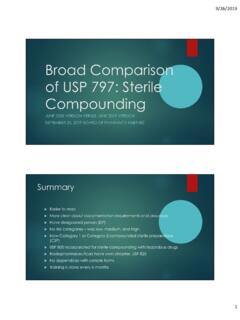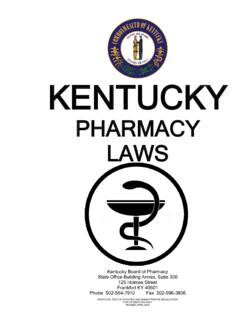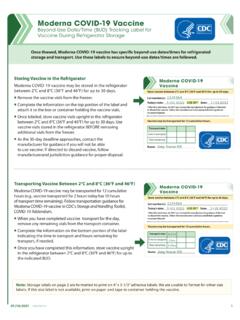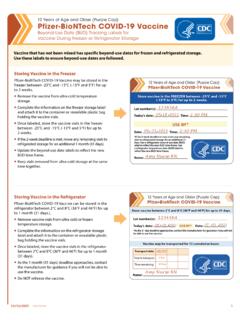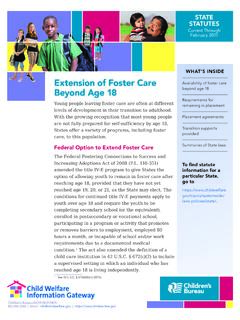Transcription of NONSTERILE COMPOUNDING: BEYOND USE DATES and …
1 NONSTERILE COMPOUNDING: BEYOND USE DATES and LABELING. BEYOND USE DATES : USP Chapter 795 defines BEYOND Use Date (BUD) as the date after which a compounded NONSTERILE preparation (CNSP) should not be used. The BUD is determined from the date the CNSP is compounded. When determining BUD, the pharmacist must take into account stability information regarding the specific drug(s) and specific CNSP. Stability information may come from documentation, literature or stability tests. In the absence of stability information, the maximum BUDs for CNSP packaged in tight, light resistant containers are: Nonaqueous Formulations: no longer than 6 months or the earliest expiration date of any ingredient used, whichever is shorter, and stored at controlled room temperatures. Water Containing Oral Formulations: no longer than 14 days or the earliest expiration date of any ingredient used, whichever is shorter, and stored at controlled cold temperatures. This includes water being added as an ingredient or water is a component of any ingredient used.
2 For example, diphenhydramine syrup has water as a component. Water Containing Topical/Dermal and Mucosal Liquid and Semisolid Formulations: no longer than 30 days or the earliest expiration date of any ingredient used, whichever is shorter, and stored at controlled room temperatures. This includes water being added as an ingredient or water is a component of any ingredient used. For example, nystatin cream has water as a component. LABELING: KRS requires prescriptions to be labeled with the common or usual name of each active ingredient and an accurate statement of the quantity of the contents of the container in terms of weight, measure or numerical count. For example, a prescription for Magic Mouthwash consisting of 40 ml of viscous lidocaine, 40 ml of Maalox and 40 ml of diphenhydramine syrup , total quantity 120 ml, cannot be labeled as Magic Mouthwash. The label must include the name and amount of each ingredient: Lidocaine 40. ml/Maalox 40 ml/diphenhydramine syrup 40 ml or Lidocaine:Maalox:diphenhydramine 1:1:1.
3 Common abbreviations of drugs are acceptable to use, however, drug names may not be shortened in order to fit on the label. In the example above, Lid/Mlx/dip may not be used. If necessary, an auxiliary label stating complete drug names and amounts may be attached to the dispensing container in addition to the standard label. USP Chapter 795 requires the BUD and storage and handling information to be on the label.


